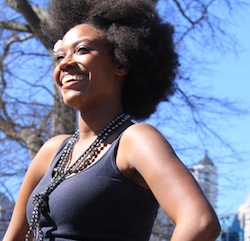
As we all know, February is Black History Month. It’s a month where we honor those who have made an impact on American culture for equal rights, those who have invented, those who have a helped others and those who have inspired everyone to be the best they can be, not only as a person of color but as a human. Last year for Black History Month, I started an online series called 28 Days Diversity where I would feature someone new everyday during the month of February for just being awesome in their own right. Even though it’s black history month, the goal for 28 Days of Diversity is to feature not just African-Americans but other minorities in the web/tech space. Also note that 28 Days of Diversity is not a popularity contest or an influencer list but a list of thought leaders in the social web sector, including entrepreneurs, bloggers, conference organizers, IT professionals and friends not ranked in any particular order who I have either met in person or followed online. Each post will include a picture, bio, two links from the selected person and this paragraph.
For 2011 I wanted to not just feature individuals but also address a topic that affects everyone. For 28 Days of Diversity 2011 each post/person will answer the question “How can we use technology to close the digital divide?” So for the next 28 days, come back to visit SocialWayne.com/tag/28daysofdiversity and 28daysofdiversity.com to see who’s on the list. For day 16, I would like to introduce to some and present to others:
Lauren Thomas
Twitter: @HelloLT
Website/Blog: http://digitalaftershock.com
Bio
Lauren Thomas is a digital marketing strategist with a passion for connecting with people through social media, storytelling, and travel.
She launched her marketing career at Grey and then went on to work at Everywhere, an Atlanta-based firm specializing in social media strategy and content development. Lauren was a member of the Everywhere team when it secured a nod in the Guinness World Records for #BeatCancer, a pro bono campaign that raised $70,000 for charity in 24 hours. She is currently a digital strategy analyst at Nurun, a global interactive marketing agency.
Lauren also speaks about new media and social media marketing and has spoken at events including the Atlanta Food Blog Forum. During the inaugural Social Media Atlanta, she served as the co-host of #DigitiniATL, a special event that celebrated the diversity of women in social media.
A recovering English major, she writes about online marketing for Examiner.com and explores the wild Web on her blog, Digital Aftershock. She is currently developing a project that will help new media newbies learn to navigate the social web.
Lauren has lived in five different countries including Ecuador and Egypt. She uses social media to remain connected with friends and followers around the world.
How can we use technology to close the digital divide?
In many ways socioeconomic inequalities are recreated and perpetuated online. That cycle contributes to the digital divide. Around the world, there are communities that lack access to technology tools and education. Those who don’t understand or have access to these tools are at a serious disadvantage. So how can we address this challenge? We can look for—and create—opportunities to provide greater access to technology tools and education. We can raise money to get technology into the hands of more people in more communities. We can also support organizations that are addressing this challenge. For example, the City of Seattle has a Community Technology Program that has a mission to “ensure digital inclusion for all.” The program provides public access terminals, supports community technology centers, offers educational resources, and provides other digital equality initiatives. There are also non-profit organizations like Computers For Youth that provide children with free computers in order to improve the learning experience at home. We can share our time and talents to support these organizations or launch new initiatives to serve our communities.
We also need to realize that the digital divide is a multi-faceted challenge and there isn’t necessarily a “one size fits all” solution. Economics and infrastructure are key barriers but social, cultural and political factors come into play as well. So the digital divide has different implications in each community. We could use technology as a tool to explore this issue and share ideas. We need to leverage digital media and social media to tap into the insights, knowledge and experiences of people from a wide variety of backgrounds including: arts, education, entertainment, marketing, science, anthropology, sociology and, of course, technology. If we leverage technology to communicate about this challenge, crowdsource ideas, and collaborate on solutions, we can take a holistic and interdisciplinary approach to better understanding the digital divide and closing the gap.
You can follow the status of 28 Days of Diversity 2011 on http://28daysofdiversity.com, https://socialwayne.com/category/28-days-of-diversity/ and syndicated on BlackWeb 2.0.
